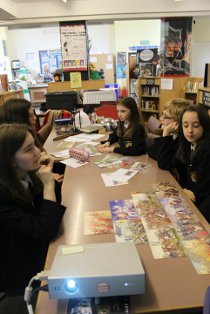Experiences of organising visits to schools to do author talks.
by Richard Denning
For an author the hardest part of the process of writing and publishing books is promotion and marketing. Getting your book read by people involves getting it IN FRONT of people. The hard grind of achieving that falls to the author not the publisher (and in many cases they are one and the same in any event).
One opportunity worth exploring is giving talks at schools. All schools are keen to bring in a variety of visitors to talk about all subjects and topics and therefore an author should think hard about whether they or their books could be of interest to the school.
1)Working out what you could talk about
Whether your book is fiction or non fiction ask yourself:
- Is the book aimed at or appropriate for Primary or Secondary age children?
- Is the subject matter one that fits with the schools curriculum? Here in the UK there is a National Curriculum that it is worth checking over to see what is actually taught at schools. Most other countries will have something similar.
- Are you an expert on your subject matter. The answer may well be yes even if you don’t think it. If you have researched a particular historical period, an area of science or a specific location the chances are that you know a lot about that – a lot more than most others anyway.
- Are there other aspects of the world of writing planning a book that could be used in a talk?
- Is there something about publishing that you can talk about. Actually getting a book published -whether mainstream or self published or Print on Demand involves many steps that has given you an experience that most people do not understand and that could be valuable.
Sit down and write out the sorts of topics that you could cover. So in my case I write Historical Fiction and also Young Adult Science fiction involving time travel to different periods. This means there are specific historical periods I know a lot about. I have also explored the physics of Time Travel as well as seen an unhealthy number of films and read too many books about it. I have developed my own method of researching, plotting and writing that I can discuss. I am self published so I have experiences of that process and because like all authors I have approached mainstream agents and publishers I know something of the stages of making submissions.
I then summarised several of these areas into a brief description:
Time Travel sound like fun until you try it The fascination of time travel and why it could be more dangerous than you think! A rattle through Time Travel in book and movie, the physics of Time Travel and its dangers. Includes readings from Tomorrow’s Guardian. Ideal for Years 6 to 8.
The Great Fire of London 1666 By Permission of Heaven! A talk about The Great Fire of London – its causes, extent and the fallout from it. Includes readings from Tomorrow’s Guardian and/ or The Last Seal and use of video, maps and my Board Game to illustrate. Can be pitched at Primary school or adapted for secondary schools.
Introduction to writing Historical Fiction Making the past believable. Looking at writing historical novels. Inspiration for ideas, researching the subject, plots and people, making it vibrant and alive. Where to go next. This is intended for Year 6 Primary school or Secondary schools.
The ins and outs of getting published – by a self published author “I would be grateful if you would consider my novel.” So you have written a book – where to go next. Researching the market, spotting the next big thing. Writing a proposal. Agents, publishers, Print on Demand, Small press and self publishing. This is intended for secondary schools and possibly Year 6 primary schools.
The Zulu war of 1879 –Great Courage and great fools! About the invasion of Zulu land in 1879 – the mistakes and the amazing heroism on both sides.
From those outlines I then planned out each talk which included estimates of timing of each bit. No plan will survive intact on contact with school children but you need A PLAN and then the ability to adapt it. I aimed for talks that would last about 60 to 90 minutes but could be shortened if needed. See more later.
2)Approaching Schools
The next thing I did was to set up a page about the visits on my website so that the schools could see what was on offer. On this website I lay out my expectations. So I specify the talks that I will do. I say something about age groups and duration. I give some idea about the sorts of activities that would go on. Then I say what I would expect in return. Now this is a delicate matter. At my stage I am very keen to get more readers and so I will go to some lengths to facilitate a visit. All I ask for is that the school buy 1 copy of each of my 4 titles at £6 each – which is not exactly a vast outlay. In the case of primary schools only2 of my titles are really appropriate so I only ask that they obtain those 2. Schools do have a budget for this sort of thing and that kind of outlay is really within their scope. You have to consider whether to charge travel costs. I say on my website that I will charge 25p a mile but will actually wave this if the school is local.
I don’t charge any form of appearance fee. My view is that I want to get my books in front of as many people as possible so why put obstacles in the way. Furthermore I am an unknown author beyond a small readership so who would pay me?
You can contact schools:
- In person by going in. This is difficult as most schools are not keen on drop in visits but it would be a way of getting material to them. It is easier if you have contacts in the school.
- By mail – but a physical mail shot to lots of schools will get expensive.
- Email. School do list contact email addresses and there are sites that list schools in each area and even ones that have lists of contact emails BUT these can be out of date quickly.
- By word of mouth. Of you get a good visit, ask the school to tell other schools.
When you have contact with a school I suggest you spell out in detail:
- The exact time and date of the visit
- The age group and group sizes you will be talking to
- What environment will you be talking in – the school hall, library or class room etc.
- Who is the supervising person. You should never be left alone with children.
- The time length of the sessions
- The subject matter you are being asked to talk about
- An agreement on terms of any payment, expenses , book purchases etc
- Can you park the car, will they feed you!
3) The Talk
Attention spans are getting shorter we are told. Therefore it is important to grab the audience’s attention and keep them engaged. As I have progressed through the talks I have done so far I have added in MORE interaction and more times when the children can get up, come forward and do something.
I take a lot of props along – such as old uniforms, weapons, armour posters from movies and books. The children should be encouraged to pick them up, talk about them and try clothing on.
I incorporate activities. FOR EG I hand out lots of post cards of histocal periods and ask them to choose one to wrire about. When exploring Time Travel I get them to play out some paradoxes and experiments and I am always on the look out for more to add in.
I build in video clips from movies and cartoons. I use power point to illustrate talks as well.
The key is to break it up. Have lots of different things going on. Get the children out to take part and involve them in discussion. Challenge them “Do you think Time Travel is possible?” “No — why not?”
4)The Promotional bit
I take along book marks and postcards and posters and liberally hand these out. I make sure that I do a reading from a book at least once in a talk – even if a brief one. I mention my website and blog and suggest if they want to find out more they go there. I DON’T try and sell the books to the children BUT I of course will do so if they ask. You wont sell many books directly at school most likely BUT you hope that some will be picked up afterwards and if the school can buy a couple then that is a result already.
I take a camera and ask one of the children to take some photos. I ask permission IN ADVANCE about this and also ask the school to check permissions for each child’s image to be taken (most schools will get parents to sign these at the start of the year).
5)Afterwards
I email the school within a day or two, thank them for having me, ask for feedback and permission to use images and ideally a quote I can use on the website. I offer to go back if they want another visit.
You can see my visits page on my site here:
http://www.richarddenning.co.uk/visits.html
For more about my time travel series go here:
http://www.richarddenning.co.uk/tomguard.html
For more about my historical fiction series go here:
http://www.richarddenning.co.uk/theambertreasure.html
For more about the Great Fire Historical Fantasy go here:
http://www.richarddenning.co.uk/thelastseal.html





